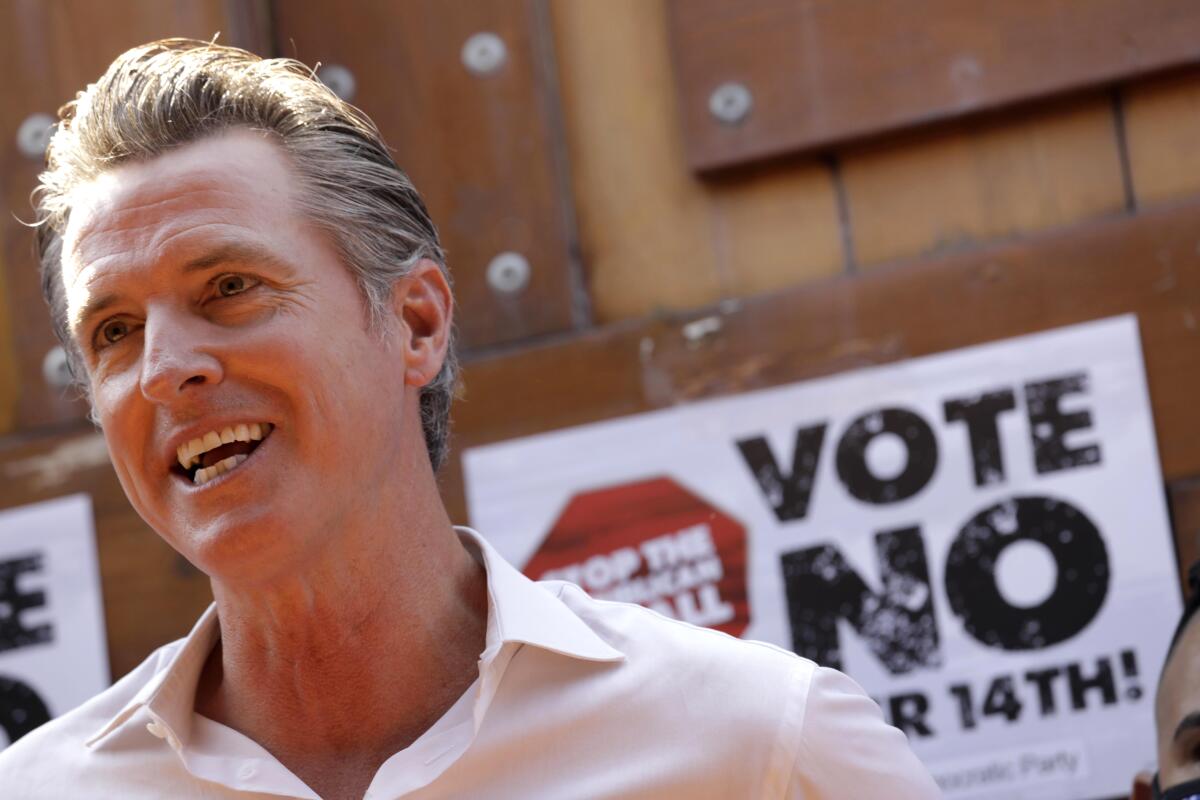Column: How anti-California propaganda and racism are driving the recall

- Share via
In the summer of 2019, as early efforts to recall Gov. Gavin Newsom foundered, right-wing commentators launched a smear campaign against California to discredit its progressive policies and stoke anger at its leaders.
They co-opted a myth popularized by white supremacists, neo-Nazis and border vigilantes in the 1990s across San Diego and Orange counties, and which conservative organizations such as the Claremont Institute have spent years peddling: California is a “Third World” state decaying due to racial diversity.
In mainstreaming the race-baiting tale, the media personalities added to the bogeymen of dark-skinned migrants the menace of homeless people.
Months into Newsom’s term, Fox News personalities claimed “zombies” were taking over California’s streets and aired dozens of segments on the disproportionately brown and Black homeless population. In the National Review, Victor Davis Hanson, a Hoover Institution senior fellow, called California “America’s First Third-World State,” a place filled with “spiking populations of history’s banes of fleas, lice and rats.”
Even then-President Trump chimed in. “You look at what they’re doing in California,” he said. “They don’t treat their people as well as they treat illegal immigrants.” He added: “We may need an election to stop it.”
Two years and a pandemic later, following sustained anti-California propaganda, a recall election finally gained traction to “stop it.” Last week, Fox News host Tucker Carlson characterized the recall as the “last chance to save the state” after showing video clips of people stealing from a San Francisco Walgreens and homeless individuals at Venice Beach. He attributed the situation to the vague villain of “equity” initiatives and gave California a new nickname: “Zimbabwe on the Pacific.”
Never mind that crime in California has been plummeting, and the recent rise in homicides mirrors a national increase tied to pandemic challenges. Never mind that California is the world’s fifth-largest economy, attracts half of the nation’s venture capital and ranks in the top 10 states for GDP growth. Never mind that the state is a leader in the fight against climate change, or that it has made significant progress on immigrant rights and racial justice, making it one of the most welcoming places for people of color to live.
It’s true that California has a homelessness problem, which is connected to high housing costs. But while conservatives blame progressive policies, it’s insufficiently progressive residents who thwart affordable housing. “If you want to blame the Democrats for something, it’s for basically caving to a core, mostly conservative constituency, which is homeowner groups and folks who don’t want to have poor people in their neighborhoods,” Gary Blasi, a UCLA law professor who studies homelessness, told me.
Recall backers caricature California as a place controlled by its most progressive residents, when in fact efforts to reduce inequality and improve equity are not readily embraced and face strong political resistance from moderates and conservatives.
At the same time, white supremacy, which threads through California history from anti-Chinese laws in the 1800s to eugenics-era sterilizations in the last century, continues to find fertile ground here. The Southern Poverty Law Center shows California has 72 hate groups, more than any other state.
For white residents who resent sharing the state with brown and Black people, demographic change in California is an existential threat. This narrative — hardly new — was on protest signs in the ’90s complaining of “a Third World cesspool” and is now on pro-recall T-shirts declaring: “I’m from a Liberal Shithole.” These people may be a minority in California, but they have powerful allies in conservative media.
Eric Ward, executive director of Western States Center, compared the dystopian narrative driving the recall effort to a “retelling of ‘The Camp of the Saints,’” a white supremacist French novel. The book, a favorite of the far right promoted by Trump advisors Stephen K. Bannon and Stephen Miller, is about the destruction of the white world by brown refugees described as “monsters” and “teeming ants.”
Ward said the anti-California scaremongering reflects a desire to convince people that racially inclusive policies will end the world. “You have to show that a multicultural, multiracial society can’t work, because if you show that it actually worked, it’s the society that most people actually choose,” he told me.
Joanna Mendelson, associate director of the Anti-Defamation League’s Center on Extremism, agrees that the pro-recall propaganda parrots white nationalist ideology, with its notion that liberalism has “injected deviant values into the system,” primarily the value of multiculturalism, which is framed as a mortal danger to white people.
Matthew Gertz, a Media Matters for America senior fellow, told me the demagoguing about homelessness is meant to trigger racism in the same way as demagoguing about immigration. “It’s not about root causes, it’s not about possible solutions, it’s about showing video footage of people living on the streets and commenting on how disgusting they are,” he said.
During the Trump era, as the U.S. experienced anti-immigrant hysteria tied to demographic change as California had in the ’90s, many saw the Golden State as a beacon of hope, demonstrating that it’s possible to overcome periods of xenophobia and racism.
In his book “State of Resistance,” Manuel Pastor, a sociologist at USC, described California as being “America fast-forward.” While conservatives saw the state as a cautionary tale, others saw it — ultimately — as the place that took chances and succeeded. Pastor wrote: “Recognizing that immigrants settle in, that economic shocks sort out, that environmental action does not sink jobs, and that raising taxes on the wealthy does not stunt growth is key to assuaging national anxieties about the challenges ahead.”
Californians who believe in the state’s potential must not cede control to those who desperately want to see it fail. The recall election has been made possible by many things, but at its root is a desire to redefine California and preserve the delusion of white supremacy.
More to Read
A cure for the common opinion
Get thought-provoking perspectives with our weekly newsletter.
You may occasionally receive promotional content from the Los Angeles Times.











